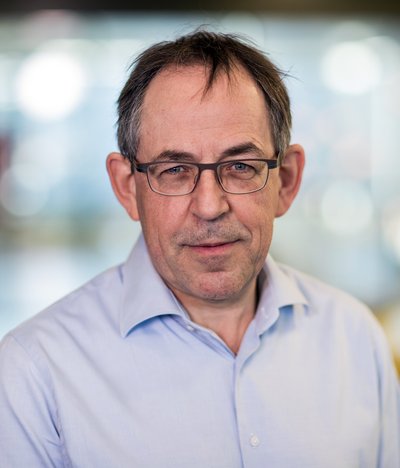Rene Janssen
Department / Institute
Group

RESEARCH PROFILE
René Janssen leads the interdepartmental research group Molecular Materials and Nanosystems at Eindhoven University of Technology, which is part of the departments Chemical Engineering and Chemistry as well as Applied Physics. The research objective of the group is to investigate and develop molecules, macromolecules and (nano)structured materials with tailored physical properties. The interest in these functional molecular materials and nanosystems is driven by the scientific challenge to understand the underlying mechanisms of the physical phenomena in systems of reduced dimensionality, down to the molecular level. Future applications are in organic and polymer solar cells, electrochemical cells, transistors and diodes.
Janssen has in particular obtained a thorough understanding of the subtle interactions of light and the chemical and electrical structures at the nanoscale. This has led to major improvements in the efficiency of polymer solar cells. The group now works on multi-junction molecular solar-to-electricity conversion devices, to further improve efficiencies. Another focus in Janssen's research is solar-to-fuel conversion using organic semiconductors in a process mimicking natural photosynthesis. To this aim new organic materials and electrocatalysts are being developed.
ACADEMIC BACKGROUND
René Janssen studied Chemistry and Chemical Engineering at Eindhoven University of Technology (TU/e, the Netherlands) where he received his MSc degree in 1983 cum laude. In 1987, he obtained his PhD at the same university with an experimental and theoretical study on organic radicals in single crystals. In 1991, he was appointed associate professor at TU/e in the field of physical organic chemistry. In 1993 and 1994, he was an associate researcher with the group of Professor Alan Heeger at the University of California Santa Barbara to work on the photophysical properties of conjugated polymers. In 2000, he was appointed full professor at TU/e in Physical Organic Chemistry at the department of Chemical Engineering & Chemistry. In 2003, he was also appointed Professor of Molecular Materials and Nanosystems at the department of Applied Physics. In 2011 Janssen was elected member of the Royal Netherlands Academy of Arts and Sciences (KNAW) and in 2013 he was appointed distinguished university professor at TU/e. Janssen received important grants and awards, among which the Pioneer grant from the Dutch science foundation NWO (1999), the René Descartes Prize from the European Commission (2000), a NWO TOP grant (2006), an ERC Advanced Grant (2013) and the NWO Spinoza Prize (2015). He is a member of the Institute for Complex Molecular Systems and one of the principal investigators of the long-term NWO Gravitation research program 'Functional Molecular Systems', which in 2012 was funded with 26,9 million euro.
Recent Publications
-
Willemijn H.M. Remmerswaal,Bas T. van Gorkom,Dong Zhang,Martijn M. Wienk,René A.J. Janssen
Quantifying Non-Radiative Recombination in Passivated Wide-Bandgap Metal Halide Perovskites Using Absolute Photoluminescence Spectroscopy
Advanced Energy Materials (2024) -
Michael A. Hope,Manuel Cordova,Aditya Mishra,Ummugulsum Gunes,Alessandro Caiazzo,Kunal Datta,René A.J. Janssen,Lyndon Emsley
Axial–Equatorial Halide Ordering in Layered Hybrid Perovskites from Isotropic–Anisotropic 207Pb NMR
Angewandte Chemie - International Edition (2024) -
Guus J.W. Aalbers,Tom P.A. van der Pol,Kunal Datta,Willemijn H.M. Remmerswaal,Martijn M. Wienk,René A.J. Janssen
Effect of sub-bandgap defects on radiative and non-radiative open-circuit voltage losses in perovskite solar cells
Nature Communications (2024) -
Osbel Almora,Carlos I. Cabrera,Sule Erten-Ela,Karen Forberich,Kenjiro Fukuda,Fei Guo,Jens Hauch,Anita W.Y. Ho-Baillie,T. Jesper Jacobsson,Rene A.J. Janssen
Device Performance of Emerging Photovoltaic Materials (Version 4)
Advanced Energy Materials (2024) -
Yang Zhou,Simone C.W. van Laar,Daniele Meggiolaro,Luca Gregori,Samuele Martani,Jia Yong Heng,Kunal Datta,Jesús Jiménez-López,Feng Wang,E. Laine Wong
How Photogenerated I2 Induces I-Rich Phase Formation in Lead Mixed Halide Perovskites
Advanced Materials (2024)
Current Educational Activities
- Advanced chemical bonding electricity and magnetism
- Molecular photophysics
- Energy
- Capita selecta
- Introduction to chemical bonding and thermodynamics
- Introduction to chemical bonding for pre-master
- Solar cells
- Topics in molecules and materials
- Thermal physics
- Advanced chemical bonding for ESoE
- Introduction to Thermodynamics and Chemical Bonding
Ancillary Activities
No ancillary activities